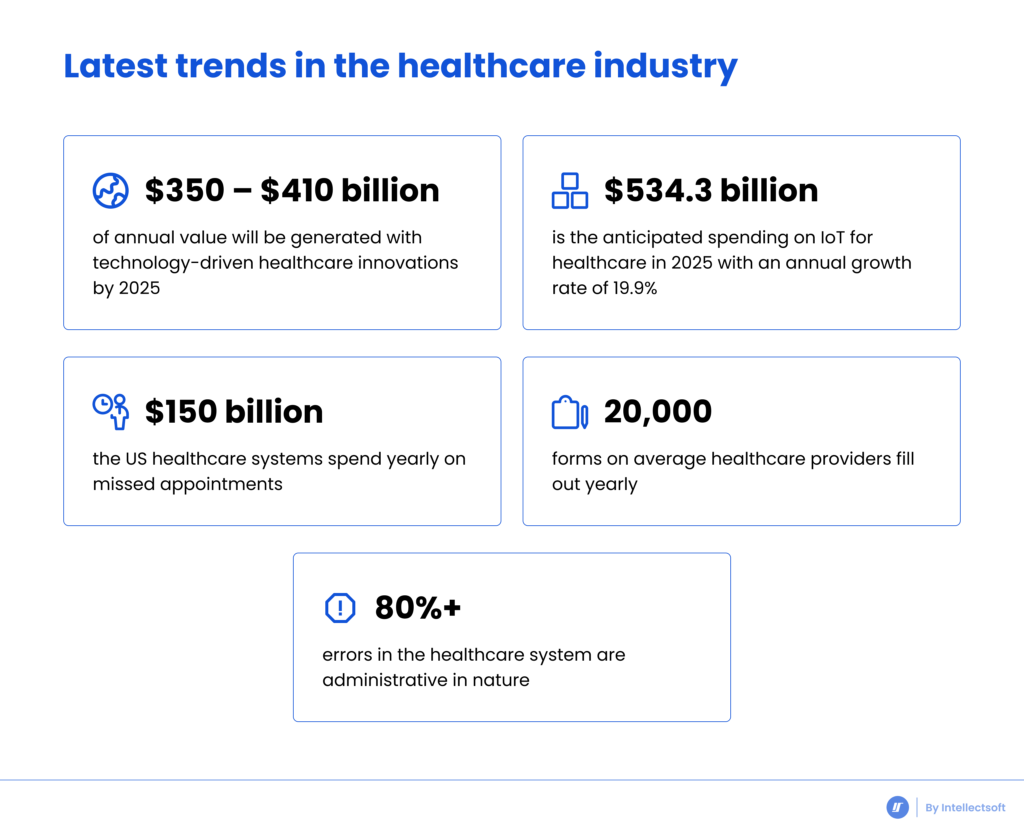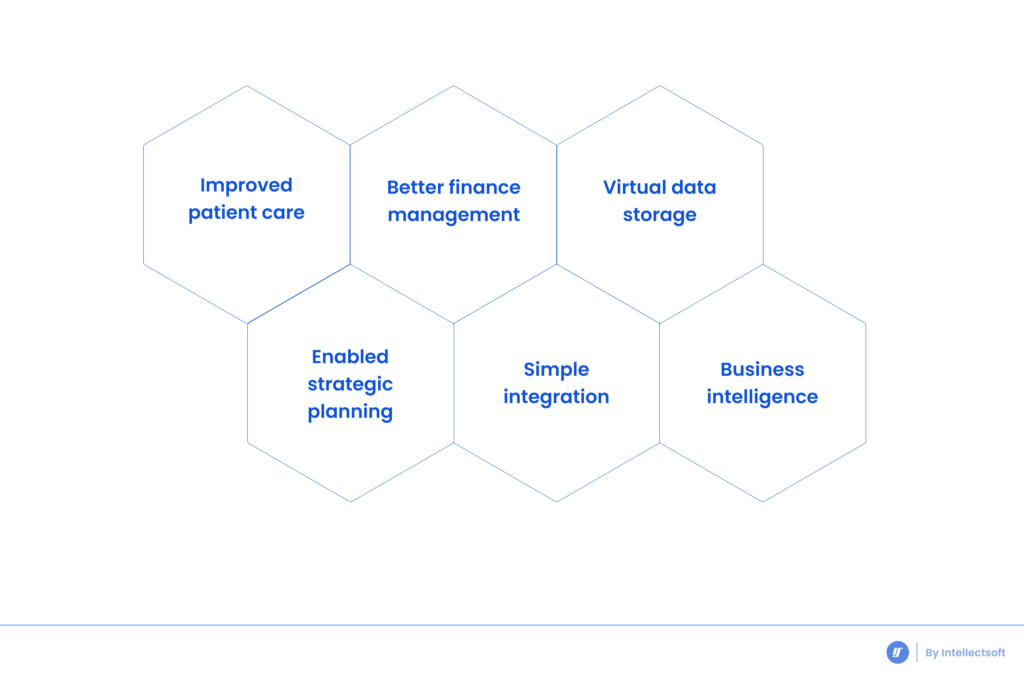
Optimized and automated operations are the essences of successful business practice. This rule is easily applied to the healthcare industry as well. Implementing the latest software solutions is crucial for any medical institution or business as it boosts efficiency and solves a wide range of challenges this industry faces daily.
Among the most common challenges healthcare providers face are the difficulty in finding patient and doctor management tools that will enable them to reduce paperwork, improve efficacy, and enhance patient care while reducing the overall budget expenses.
More and more organizations have started adopting medical ERP software with exceptional functionality that fits perfectly in every hospital.
It is one way to enhance any healthcare organization's efficiency. For hospitals of different sizes, the enterprise resource planning system helps to overcome operational challenges, provide better efficiency of the services, and correspond to the needs of the modern market.
In this post, we’ll provide a detailed overview of healthcare ERP solutions, including their types, benefits, and implementation peculiarities.
What Is ERP and What Is It Used For?
Enterprise resource planning (ERP) is a modular software solution that centralizes the organization’s information, optimizes connections, and facilitates data sharing between enterprise departments. With its help, a company can establish end-to-end connectivity of all the running business operations, including the relations with vendors and customers.
The ERP system brings together multiple modules and facilitates cooperation between various departments of the company. This way, distinct business units can constantly communicate, interact, and share data while dealing with daily operations.
Even more, the ERP system stores all the relevant information and enables automation of collecting and using corporate data for the business’s benefit. In this regard, ERP systems harmonize the decentralized workflow which usually adds some hurdles to process management.
6 Ways ERP Software Benefits Healthcare Business
ERP system for healthcare is a multifunctional software tool that adds value to hospitals in a number of ways, including cost savings, improved efficiency, enhanced collaboration, and optimized patient management.

The exact list of advantages of medical ERP includes:
1. Improved patient care
The first core benefit of ERP systems in hospitals is enhanced patient care. As the system minimizes paperwork for doctors, and reduces their time spent on finding the patient data, they significantly improve the patient service quality as doctors can focus on patients more than on redundant administrative tasks.
2. Better finance management
ERP systems are perfect for managing hospital finances as well. It will make it so much easier to process and control all patients' payments as well as hospital operating expenses. It also minimizes administrative errors to avoid any unnecessary costs.
3. Virtual data storage
Enterprise healthcare systems allow organizations to store effectively all their strategic data related to their patients and business operations. The system can enable full privacy and confidentiality so you can be certain no data leakage is possible. In addition, it’s very convenient for employees as it allows easy data access for anyone as all data will be stored in one system.
4. Enabled strategic planning
Enterprise healthcare software will be very useful for owners and hospital managers to make well-informed strategic decisions. It’s easy to analyze all core success indicators of the hospital to improve the overall results in the future.
5. Simple integration
It’s worth noting that some hospitals still use very outdated systems that are super challenging to maintain. A medical ERP solution is a nice way to streamline all the operations. This software enables the integration of all the departments including HR, finances, and inventory to improve the efficiency of work in the hospital.
6. Business intelligence
Medical ERP system is an important tool for those who run hospital operations. It’s an integrated solution that provides better business intelligence and enables generating more financial value for an organization by assessing the hospital’s performance and detecting areas for potential improvements.
All in all, ERP increases productivity and efficiency; introduces interconnection between various departments, suppliers, vendors, and provides storage for data-driven insights.
As for the possible limitations of healthcare ERP software, companies should be ready to address these three factors:
- Prices: You’ll need to cover the expenses of ERP consultants, server providers, in-house IT specialists, and software implementation.
- Maintenance: As technologies develop, the system should be constantly updated and enhanced in order to maintain the level of compatibility of the company.
- Training and Education: You should show your employees how to use the system and notify departments about new tools and functions added.
Types of ERP Systems in the Healthcare Industry
Over the years of deployment, ERP systems have developed and grown in their number. Nowadays, they can be classified according to the implementation process and a number of functions.
Nowadays, there are three types of ERP classified by implementation:
- On-premise (for large healthcare institutions)
- Cloud ERP (for small healthcare institutions)
- Hybrid (for developing healthcare institutions)
1. On-Premise ERP System
On-premise software requires in-house installation and maintenance, meaning its availability on the organization’s computers and the presence of an internal IT team.
There is no need for an Internet connection to get access to the information stored on-premises. Servers are owned by the organization, and an IT team takes care of the software and constantly updates it. Large businesses can consider this type of ERP software implementation, as having a license for the program means having control over every module and aspect.
2. Cloud-Based ERP System
Companies can purchase cloud ERP from third-party vendors on a monthly or annual basis. It grants access to the data anytime and anywhere via an Internet connection.
There is no need to employ IT specialists, as cloud ERP will be maintained by the vendor. That’s why it’s important to find a reliable tech partner. Generally, this software type is cheaper than the on-premise one and suits the needs of small businesses more.
3. Hybrid ERP Systems
Hybrid ERP is a combination of on-premise ERP and cloud-based ERP. It perfectly suits the needs of companies that occupy a specialized niche.
The cost of hybrid enterprise resource planning maintenance depends on its sophistication. Usually, businesses turn to a hybrid ERP system when they need to integrate cloud-based modules into existing on-premise software as they grow. So, data is split into two parts — on-premises and on-cloud.
If you don’t know what type of healthcare ERP system would suit you most, you have to define your needs first. If you are a small developing organization in the field of healthcare that strives to optimize the internal processes, then a cloud-based option will be a more reasonable choice for you.
Speaking of healthcare giants that want to digitize their businesses and innovate — on-premise ERP software will be more suitable. It will be more costly and time-consuming but at the same time, it will enable exceptional personalization and system customization based on their specific business goals.
The hybrid option can be a good match for many organizations as it’s a combination of both and incorporates all the best practices of both on-premise and cloud-based systems.
Healthcare ERP Solution Components
ERP systems combine a number of modules and sub-modules that are interconnected and distinguished by serving a particular hospital area. Each module contains several sub-modules or tools that manage different tasks and projects. Combined together, modules cover all organizational operations, both internal and external.
Usually, each ERP task is collaborative, meaning that employees from different departments can be added to manage and complete the request on time.
Usually, ERP systems consist of Human Resources, Sales, Finance, Logistics, and Inventory modules. Other modules can be added to the system if your organization has specific needs and wants to automate certain operations.
- Electronic health record: An ERP system can be easily integrated with an EHR that can significantly boost your operational efficiency. It will allow you to control the supply chain of your hospital as well as analyze and predict the needs of patients and suppliers.
- Human Resources: This module handles employee management tasks such as enrollment, offboarding, timesheets, and benefits administration. HR components can automate payments calculation, thus reducing human error and time spent on monotonous tasks.
- Patient Relationships Management: CRM module stores and stacks generated patient data. It will help you easily store, access, and manage all relevant patient information including health records and payments.
- Business Intelligence: This module helps to solve issues related to hospital data collection, analysis, and report delivery.
- Inventory Management System: This ERP element keeps track of all the inventory of the hospital and automatically updates your system for the employees to know whether some medicines or other materials are out of stock.
- Financial Management: This component analyzes and keeps track of the financial data of the company. It helps to control the enterprise’s budget, spent costs and received payments
Any other components can be added to the system per your requirements. The main issue here is to have a team of employees who are capable of creating and integrating new functions.
Core Features of an ERP System
- Centralized database: This feature is needed to comprise the data flow from all the hospital departments and store it in one place.
- Modular: The system consists of a number of interconnected modules.
- Flexible: The system can be upgraded according to the healthcare organization’s needs by replacing functions or tools or adding new modules.
- Automated: The main ERP purpose is to automate manual processes and omit duplication of the information for healthcare administrative employees.
- Time and cost-effective: As the system automates operations, it saves time spent on a product or facility delivery as well as reduces costs.
- Real-time analytics: An ERP system will help you easily analyze your organization’s performance and financial condition so that your team can make all possible business amendments. ERP reports usually include visual representations of your performance to identify bottlenecks and solve issues.
ERP Implementation Process
An ERP implementation process is a complex and all-inclusive process of planning, system deployment, data migration, and user training. These are the main stages needed for your healthcare institution to successfully transfer to a new ERP system while maintaining your best practices.
There are two possible methods of implementing ERP software for your healthcare organization. The first one consists of transitioning to a new system at once meaning all the data will be switched to ERP software and all employees will start using it simultaneously. The process will take less time but you have to be ready for the potential technical issues depending on the amount of data stored.
The second method means that you will transfer data in clusters by function or priority, and your team will be switched to a new system gradually step by step. It goes without saying that the second option takes more time but it will potentially cause fewer technical problems while transitioning.
Probably you are also wondering how long the implementation process of an ERP system takes on average. The answer is the overall ERP implementation should never be rushed. This is a very serious step for your business and many internal processes will depend on the success of the implementation so you have to stay patient.
Generally, it will take from 3-9 months but it varies from one case to another and you should take into account all your business peculiarities that will shape the final date. The factors that define the length of the process include the healthcare business size, complexity, locations, languages, and currencies involved, etc. So now, let’s take a closer look at the main implementation algorithm.
Algorithm
We recommend following this process to get the most from an enterprise resource planning implementation:
- Define your desired results by understanding your business aims and current processes.
- Do not automatically reuse old workflows to make sure you’re bringing in the changes needed.
- Map all your business processes to create a clear business case.
- Select the right solution and partner who is capable of running the implementation process to the end.
- Create a long-term ERP plan that drives your business forward.
- Ensure executive-level support so that every department is involved in the process and creates a perfect architecture for your business.
- Assemble the right project team with key players assigned during every implementation stage.
- Focus on getting the right data for a smooth and accurate migration process.
- Standardize the process and minimize development to the basic functional suit to which you can add further enhancements in the future.
- Plan training to educate the employees and teach them how to use ERP.
Mistakes & Best Practices
Now, let’s take a look at the best practices for Implementing the healthcare ERP system as well as the mistakes you should avoid to make this process as smooth as possible.
1. Plan thoroughly
Some healthcare companies underestimate the importance of planning before even considering developing an ERP system. It’s very important not to rush with any decisions and actions, and to plan all the processes from the very beginning to the system launch. You need to create the foundation for all future processes. Yes, it will take time, but once you start the development process, everything will happen faster and more smoothly with the minimum risks of failure.
2. Invest in support and training
After your collaboration with external vendors, don’t forget to invest your resources in training. After the system deployment, you still have to ensure its technical support, fix potential issues, and be able to provide system updates. It’s going to be the biggest mistake not to allocate a budget for tech support and proper employee training as well. All staff including doctors and representatives of other administrative departments have to be confident and comfortable using a newly adopted software for their better efficiency.
3. Arrange data migration
Some organizations don’t plan data migration accordingly or simply migrate all old data to a new ERP system and it might create some bottlenecks in the future. Pay attention that some information can be outdated and unnecessary and there is no point in transferring it to a new system. It’s your unique chance to clean up your system a bit and leave only relevant data that will come in handy.
4. Communicate effectively
The last but not least mistake that healthcare business owners make is they don’t communicate enough through all the stages of the ERP solution implementation. It’s paramount for the whole team to communicate with the software company to make sure that everything is done according to your initial business requirements and needs. The development process of this software is very costly and time-consuming, therefore, it’s your main priority to make sure that everyone is aligned and nothing goes off track.
Consider Intellectsoft Your Healthcare ERP Software Development Partner
ERP solutions facilitate operational processes for healthcare businesses of any size. Being highly flexible, the ERP software is tailored to your needs and expanded as required.
We recommend companies use enterprise resource planning technology as a tool to reduce the time spent on daily operations, increase revenue, and enhance relationships with customers and vendors.
We, at Intellectsoft, empower companies and their workforce with cutting-edge transformative solutions and data-driven insights. Among our enterprise software development services, you can pick the set of modules and technologies needed for your business needs.
Are you and your organization ready to shift mindsets and get the most out of innovations? Talk to our experts to request an ERP software solution from us!
FAQ
How to build a custom ERP solution for your medical organization?
Collaborating with an outsourcing partner is the most cost-effective option if you want to build any custom solution for your organization. Intellectsoft is a trusted software engineering partner with more than 14 years of experience developing software products of different complexity for different industries as well as IT consulting for companies to make their software development initiatives more smooth. Take a look at the IT solutions for healthcare that we offer to our clients.
After we sign an NDA agreement, our team takes over all the processes starting with designing the ERP solution according to your business requirements and needs and to the product launch. During all stages, we will collaborate tightly with your team to achieve the best possible results. Even after the development process is over, our specialists will still maintain your software to make sure it runs smoothly and effectively.
How much does healthcare software development cost?
It is very hard to predict the final price for software development in the healthcare sector. Costs usually depend on several factors and if it’s crucial to get precise figures, we recommend you to get in touch with our professionals who will guide you through the processes and will give you your project's estimates.
However, if you want to know more about the costs of outsourcing as well as ways you can optimize your spending on your IT initiatives, read this article to explore valuable information based on the expertise of our in-house experts.
Is developing a customized medical ERP system worth it?
As we demonstrated in our statistics, the investments in healthcare technologies keep increasing and the importance of digitizing the industry also grows exponentially. No matter what healthcare field you offer your services, either general medicine, dentistry, or psychiatry, you will be able to harvest positive results soon.
Therefore, by allocating your budget for enterprise application development for your healthcare organization, you will be able to boost employees' efficiency, maximize the patient satisfaction rate, minimize possible errors, and reduce the paperwork so your employees can offer better care to all the patients.



